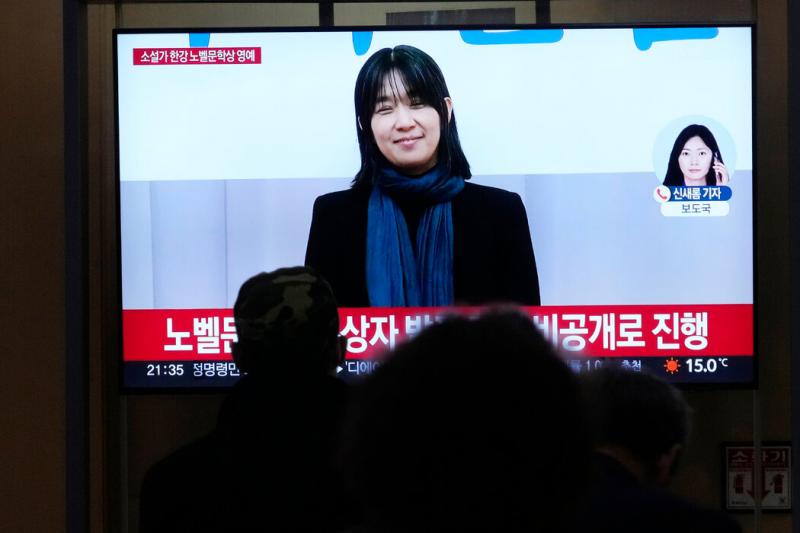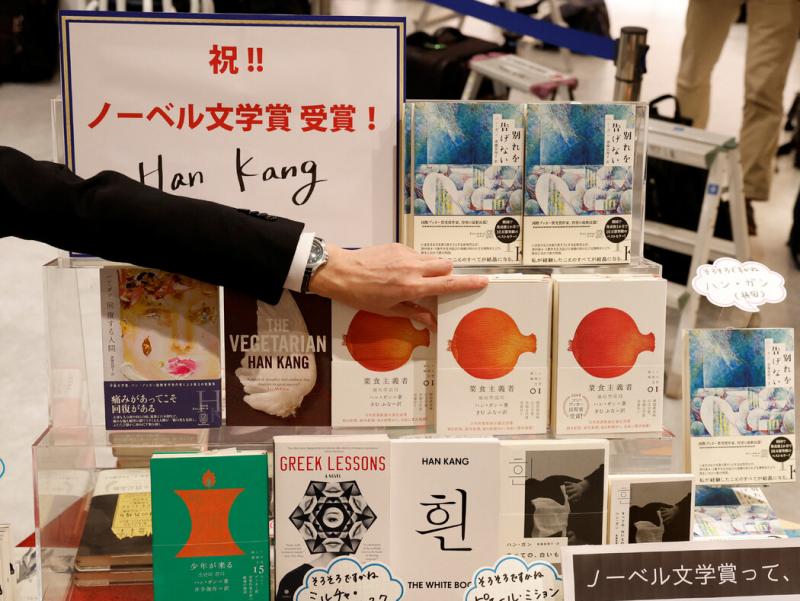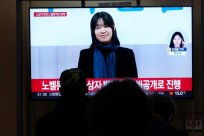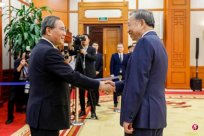
On Thursday, Korean writer Han Jiang, famous for the surrealist novels, was awarded the Nobel Prize in Literature. She was the first writer in South Korea to win the award.
The executive secretary of the Swedish Academy of the Swedish Academy of the Swedish Academy of Literature, Matz Malm, said at the press conference held by Stockholm that the reason for the award was "she faced historical trauma with a fiery prose and exposed the vulnerability of human life" "Essence
Vegetarians were published in South Korea in 2007 and were translated into English, and the book won the 2016 International Booker Award.This book tells the story of a depressed housewife shocked her family because she stopped eating meat. Later, she completely stopped eating and eager to become a tree that lives only by the sun.Brochstar Capur said in a book review written for the New York Times that Han Jiang "is known as a prophet in South Korea, which makes sense."
Han Jiang won the Nobel Prize a surprise.Prior to the announcement of the award list, the best winner of the gaming company was the Xue Xue, a Chinese pioneer writer who was very difficult to classify.However, the news that Han Jiang's award -winning news caused by writers and book fans in social media has also been warmly welcomed in South Korea.
President Yin Xiyue said in a statement: "This is the great achievement of Korean literature and the moment of celebration of the country." He pointed out in the statement that Han Jiang has the ability to capture the painful clips in modern Korean history.Members of the Korean pop BTS (BTS) also celebrated, one of the members added a crying face and a heart expression next to Han Jiang's photos.
In South Korea, some people were surprised to learn that it was a Korean writer award."When I saw this news, I couldn't believe my eyes," said Pu Xiangren, the office worker in Seoul."No one tells us that we have a very promising candidate this year."
At the same time, many people think this is a suitable choice.Han Jiang's novels do not say goodbye (We do Not Part) will be published in the Hegas Press in the United States in January next year. One of her translators Peggy Ania Morris said that Han River's pioneering works are heavy.Plastics in South Korea's literary pattern.
"Han Jiang's works inspired a generation of Korean writers and made them more real and bold in subject matter," Morris said."Once again and again, she bravely faces the culture of censorship and preservation of Face. She every time she has a stronger and more firm work to frustrate those attempts that let her shut up."

Han Jiang, 53, was born in Guangzhou, South Korea in 1970.Her father is also a novelist, but she is far from her success.The family is economical and often moves.In an interview with the New York Times in 2016, Han Jiang said that her short -term growth period was "too difficult for a child, but I was okay because I was surrounded by the book."
When Han Jiang was nine years old, the family moved to Seoul. A few months later, the Guangzhou Uprising occurred. The government forces fired to protesters who support democracy, causing hundreds of people to die.She said in an interview in 2016 that this incident shaped her view of human violence, and her ghost has always troubled her writing.In her 2014 novel teenager, a writer witnessed the police for investigating a group of activists.
She also recalled the picture of people who saw people who were lined up to donate blood in the uprising.
"This is like two unsolved riddles, printed in my mind: how can humans be so brilliant and how can humans be so lofty?" She said."When I write a novel, I find that I always go back to what the theme of being human."
Novelist Heran Diaz praised Han Jiang's "rumor that he was good at listening to history" and said that she could "touch and hurt the trauma of a whole generation of people, and she never regarded her novels.Become a simple preaching tool. "
Han Jiang studied literature at Yanshi University, and the earliest published work was poetry.Her virgin Black Deer was published in 1998, telling the mysterious story of a missing woman.In an interview in 2016, Han Jiang said that about at that time, she had an idea to create short stories about a woman into a plant, and she finally wrote this story as a vegetarian.
After the debut, she wrote the Seven Minister's Novels, as well as a few novels, prose and short stories.Her other novels include The White Book, which has also been nominated by the International Booker Award and the Greek Lessons published in English in 2023.
In Greek time, a woman lost the ability to speak, and she tried to recover this ability by learning ancient Greek.In the book review written by Idra Novi, the novel "praises the indescribable trust that can be seen in the shared language."
"Han Jiang is a prophet, and there is no other word to describe it," Han Jiang’s North American publisher He Gas' executive editor Parisa Ibrahmi said that she pointed out that Han River's works reflected the reflection of the work of Hanjiang's works."The extraordinary insight into women's inner life."
She said that Han Jiang's works are now highly respected in South Korea, but it took some time, and some of her books were not understood at first.Han Jiang said that vegetarians are considered "very extreme and weird."
She published novels and poetry in her country for more than 20 years before she had an English translation. At that time, Dubberra Smith translated vegetarianists and sold it to a British publisher with only the first 10 pages.
In 2016, the English version of vegetarians was widely praised, and it promoted the new wave of translation of more experimental novels, including female works with feminism.
"The success of her works, translations, and works prompted the translation of Korean literature more avant -garde, experimental, and bold," said Korean translation and writer Anton Herr who lived in Seoul."She changed the dialogue about Korean literature."
Anji Mukji, a professor of literature at Oxford University, said that in the past 20 years, she taught Han Jiang's works in the classroom."Her works are always political -whether it is physical, gender politics, or politics for people to fight with the state -but her works have never given up literary imagination," Mukji said."Her work has never been high, but playful, interesting, and surreal."
The Nobel Prize is the highest award in the literary world, and the award is the pinnacle of the cause of the writer, poet or playwright.In the past, the winners include Tony Morrison, Harold Pinte, and Bob Dylan in 2016.In addition to the great improvement of prestige and sales, winners can also receive a prize of 11 million Swedish Crown (about $ 1 million).
Although the Nobel Prize winner is relatively young, she is much older than Ladiad Gilprin, who has won 41 years old in 1907.
In recent years, due to women or the number of winners from Europe and North America, the School of Arts has been working hard to increase the diversity of the Nobel Prize for Literature.
Since 2020, the Academy of Literature has awarded the award to the colorful race -Tanzanian writer Abdullara Zak Gulner. His novel analyzes the problem of colonialism; and two women -—— American poet Louis Gluk and French autobiographical writer Annie Enock.
Last year's winners were Norwegian writers and drama writer Jon Fushe. His novels were described in a long sentence, often containing religious colors.
Han Jiang is the 18th woman who won the Nobel Prize in Literature. Since 1901, NuoThe Bell Literature Award has been awarded 120 writers.
Some scholars and translations believe that South Korea's first writer to win the Nobel Prize in Literature is a woman, which can be said to be appropriate.Many of the most pioneering and provocative contemporary Korean literature are created by female novelists. Some of them challenged and revealed the burdens that Korean women suffered.However, in the media and literary circles, older male writers are often considered the most likely to win the Nobel Prize.
Morris said: "Over the years, the discussion about how to get South Korea to win the Literature Award seems to have never considered the answer.The works of Korean women such as Park Jingli and Li Zhimin."Therefore, it is a surprise to see a woman becoming the end of the Korean Literature Nobel Prize.



